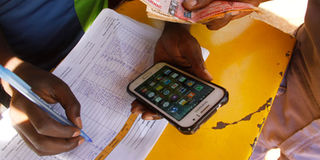Impact of mobile money tax beyond telecoms

Impact. Mobile money transactions have drastically reduced since July. FILE PHOTO
What you need to know:
- For years, Elia Kashijja, who owns Elia Investments, a mobile money outlet, had witnessed a flourishing business notwithstanding the stiff competition in the sector.
- However, since July his fortunes have been reversed due to the introduction of the mobile money tax.
- Impact. Telecoms have been the primary losers since the implementation of mobile money tax. However, beyond telecoms are agents, consumers and government policies that had been influenced by the mobile money revolution.
Kampala. In March last year, Mr Benedict Ssekabira, the then Bank of Uganda executive director, told a meeting, which had been convened for the launch of the Instant Interbank Transfer system that the Central Bank was working on a strategic plan that would reduce the use of paper notes in Uganda’s money markets.
The plan, he said, would target 2022 as the year in which paper money transactions would have substantially reduced and replaced with electronic or digital payments.
This would be achieved under the National Payments Policy that the Central Bank says will soon be submitted to the Ministry of Finance for review.
“We are fast-tracking the National Payments Policy. The draft is now ready,” Mr Mackay Aumo, the Central Bank national payments systems director, told journalists at the MTN and Mastercard partnership launch.
The partnership seeks to promote electronic payments through mobile money and virtual cards.
Therefore, the Central Bank had been inspired by the increase of electronic movement of cash through mobile money to develop a policy that would substantially reduce paper transitions in about four years.
Currently, paper transactions account for 76 per cent of payments in retail trade and the desire to cut it substantially has never been more urgent than now.
Mobile money has been one of the biggest revolutions in Africa and particularly in Uganda’s money markets in the last six years.
One would therefore understand why the Central Bank would leverage on it to attain a cashless economy.
However, the industry has been disrupted in the last three months and continues to be under pressure because of excessive taxation.
In July government implemented a 1 per cent tax on every mobile money transaction in addition to an increase in Excise Duty from 10 to 15 per cent.
The new demands threw the industry in a near crisis that would later see mobile money transactions decline by Shs670b in only two weeks of implementation.
The decline is yet to stop amid a review by Parliament of the 1 per cent figure that was instituted on every mobile money transaction.
In the weeks after the 1 per cent tax implementation, President Museveni said there had been an omission as Cabinet had only endorsed 0.5 per cent and not 1 per cent.
The law has since been sent back to Parliament and consultations are ongoing.
However, amid all this, telecoms, agents and consumers, continue to register losses and have recorded significant drops since July.
Ms Sumin Namaganda, the Airtel public relations manager, in an email exchange yesterday noted significant drops in volumes and value of transactions have been registered, saying the tax has negatively impacted the telecom’s mobile money space.
“Excessive taxation of mobile money which is still in its infancy [has reduced] uptake and [will in the long-run undo] positives to the citizens, government and the economy at large,” she said.
However, Ms Namaganda is optimistic that the ongoing review of the Excise Tax Amendment Act 2018 will provide a better and mutually beneficial tax regime.
“Government has been responsive to long term investor needs. We believe it will continue to enhance confidence,” she said.
The Central Bank, which has leveraged its National Payments Policy on mobile money, has already indicated support for the 0.5 per cent tax despite conflicting reports of its impact to the economy.
In its first month of implementation, Uganda Bureau of Statistics indicated that inflation had in August rose to 3.1 per cent on the account of mobile money and social media taxes.
However, the negative impacts have not deterred government, according to State minister for Planning, David Bahati, from pursuing the mobile money tax, whose negative impact on the economy has already been documented.
MTN, according to Ms Elsa Mussolini, the telecom’s mobile money general manager, has already seen substantial drops in both volumes and transactions.
Yesterday, Mr Val Okecho, the MTN communications manager said, the impact has been massive with the telecom recording a 27 per cent decrease in total transaction value.
The industry, he said, has recorded a combined decline of about Shs1.5 trillion.
Therefore, how the Central Bank hopes to achieve a cashless economy amid disruptions in a sector on which it has leveraged some of its policies remains a question.
Experience from an agent
For years, Elia Kashijja, who owns Elia Investments, a mobile money outlet, had witnessed a flourishing business notwithstanding the stiff competition in the sector.
However, since July his fortunes have been reversed due to the introduction of the mobile money tax.
“I would serve an average of 120 clients every day. However, the number has dropped to less than 50,” he says, noting the business has not been good since July.
Clients, he notes clients find it cheaper to transport large volumes of money than sending them via mobile money.
“I gave up on sending high value transactions because they attract a high charge,” says Ms Mariam Kayinja, a trader in Kampala.
The silent withdrawal of clients continues to affect the mobile money space and will have long term effects, according to telecoms.




